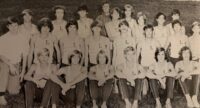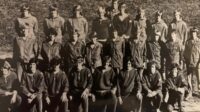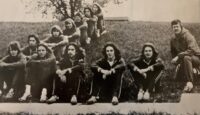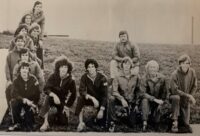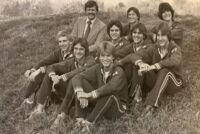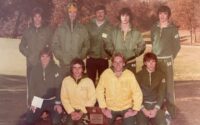Inductees
1972-1979 Lindbergh High School Boys Cross Country

The story goes that Tom McCracken, still young and passionate as a 20-something track & field coach, successfully lobbied the athletic director of Lindbergh High School to make him the head coach of the boys cross country program.
This was in 1969.
“I didn’t know any better and said, ‘If you give me this job, I’ll give you a state title in four years,’” McCracken said.
And when you got the job?
“Well,” McCracken said, breaking into a laugh, “I told the kids about it and said, ‘You have no choice – get your butts out there and start running,’”
That they did. Lindbergh’s Flyers pulled off the feat, winning the state championship in 1972 en route to dominating 1970s high school cross country. It’s why the Missouri Sports Hall of Fame proudly inducted Lindbergh Boys Cross Country’s 1972 to 1979 Teams.
After all, Lindbergh also captured state championships in 1974, 1975, 1976, 1977 and 1978 – and enjoyed runner-up seasons in 1973 and 1979.
In other words, the Flyers embodied the school’s namesake, Charles Lindbergh, who in 1927 overcame enormous odds and skeptics by becoming the first to pilot solo across the Atlantic Ocean – a 33 ½-hour trip.
McCracken pulled off quite a feat, too.
A St. Louis native, he was part of the Southeast Missouri State University track & field team.
“No. 1, you’ve got to get the kids out,” McCracken said.
And with a lofty goal of recruiting 50 runners, McCracken set out. However, only a few joined the inaugural team.
Still, he not only challenged the runners with long runs – to build endurance – but also repeatedly used positive-thinking techniques from a book titled, “Psychocybernetics” by Maxwell Maltz.
Eventually, the Flyers believed they could win state.
In 1971, McCracken’s team finished seventh at the state meet.
“We had no business talking about (winning it) the next year,” McCracken said. “But that 1972 season, the next thing you know, in each meet, the boys kept passing people.”
At the 1972 state meet, Lindbergh scored 79 points, with Darren Davison (5), Mark Leicht (14), Gary Steffens (15), Dave Bender (17) and Jim Lattner (28) scoring the points. They were eight points better than the runner-up.
The 1973 team placed second. Leicht (5), Tim Biscan (21), Lattner (33), Bill Seffens (34) and Eric Becker (35) scored the points.
By now, participation numbers were growing past 40, with runners pushing the top guys.
The 1974 team’s top three all ran in less than 10 minutes, and its top seven overall finished within 21 seconds of each other. They were Becker, Seffens, Kurt Peter, Steve Roach, Kurt Staufenbiel, and then Mark Kruse and Ken Resse. In the preseason, the team logged 20,000 miles.
The 1975 state team was led by Kevin Bauer (seventh), followed by Staufenbiel (ninth), Becker (10), Roach (11), Rick Winkelhoch (13), Reese and Reid Spaulding.
“If (an injured Becker) couldn’t have finished,” McCracken said, “our No. 6 man would have become our fifth. And the interesting thing is, if that would have happened, we still would have won.”
Overall, that team had a season national-best 14 runners who finished in 10 minutes or less.
The 1976 season was a surprise, as Lindbergh had graduated four runners. And other top teams returned a majority of runners.
Still, Winkelhoch, Spaulding and Craig Miller placed sixth, seventh and 14th, with Tom Pryse (17), Bob Walther (30), Dave Nassar (34) and Mike Roach (58) also competing.
“With a team of ‘no-names,’ you not only won more meets by lower scores than ever before, you also won the ‘big meet’ by the lowest score in LHS history,” McCracken told the ’76 team.
In 1977, Winkelhoch was the state runner-up, Craig Mueller 11th, Dave Nassar 13th, Brian Blackford 16th and Walther 25th, followed by Steve Hornung and Bob Hampel.
In 1978, Lindbergh celebrated two championships – the team title and Bryan Blackford’s individual one. His time of 13:09 edged the runner-up by less than two seconds. Phill Hoffman (10), Scott Lackey (23) and Andy Maletick (27) scored low points, too.
The 1979 team was only three points away from winning it all. Blackford (2), Bullard (7), Lackey (9), Gary Jones (27) and Tom Mobley (49) scored points. Bullard made the team score close, rallying after being spiked and losing a shoe at the start.
Literally, the 1970s were quite a run for Lindbergh.
“You just can’t give up,” he said. “They didn’t come in as superstars, but they left as champions.”
